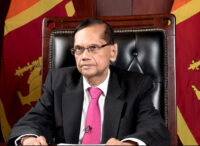Sri Lanka’s debt crisis stems largely from years of inflated and non-competitive government-to-government infrastructure deals rather than external economic shocks, with the cancelled Adani Mannar wind power project illustrating the scale of governance failures, economists from SOAS University of London said.
Presenting a new study on the political economy of public debt in Sri Lanka and Bangladesh, SOAS Professor Pallavi Roy said the proposed tariff for the abandoned 250-MW Adani project in Mannar was about 120% higher than that of a comparable 300-MW Adani wind farm in India’s Gujarat, despite Mannar having significantly stronger wind resources.
“On technical grounds, one would have expected the unit cost of electricity in Sri Lanka to be lower. But we observed completely the opposite,” Roy told a forum hosted by the Open Society Forums.
Her team estimated the ideal tariff should have been closer to one-third of the proposed price and warned that a fully dollar-denominated structure would have shifted substantial foreign-exchange risk onto households.
Ulrich Volz, also of the University of London, said such projects lay at the heart of the country’s debt distress.
“About 65% of foreign debt was spent on transportation, power, energy, water and airport projects,” he said, adding that mismanagement and opaque procurement had weakened tax compliance. “People do not want to pay taxes when they feel money is not used wisely.”
Mushtaq Khan, Professor of Economics at SOAS, argued that transparency and audits alone are insufficient in political settings where rule enforcers lack incentives.
Effective oversight, he said, requires “horizontal checks”, pressure from firms and communities with the capacity and interest to demand compliance.
He cited cases in Bangladesh where lowering political risk for independent investors sharply reduced collusive pricing in the power sector.
For Sri Lanka, he said, avoiding government-to-government deals, ensuring genuinely competitive tenders and giving local actors a stake in project quality are essential to preventing another cycle of overpriced megaprojects.
“Without this, Sri Lanka will once again lock in inflated costs that feed foreign debt and expose citizens to avoidable financial risk,” Khan warned.











Leave a comment